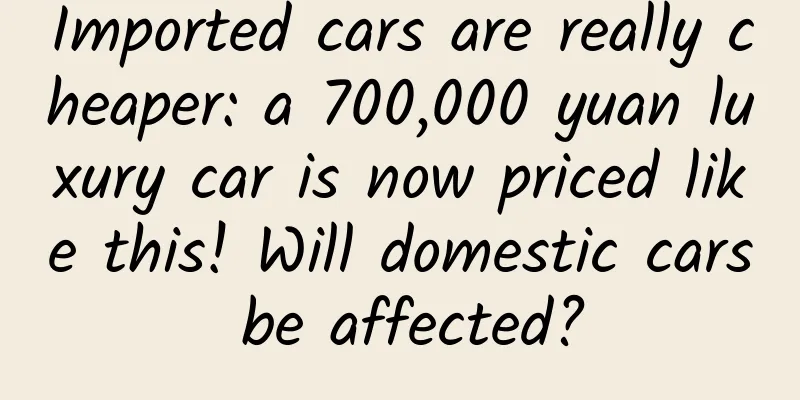Imported cars are really cheaper: a 700,000 yuan luxury car is now priced like this! Will domestic cars be affected?

|
Not long ago, the State Council Tariff Commission issued an announcement that starting from July 1, 2018, the tariff rate for imported complete vehicles will be reduced from 25% to 15%, and the tariff rate for imported auto parts will be reduced to 6%. What is the impact of this on consumers and dealers? Import car tariff reduction: dealers cut prices in advance, consumers react differently After the announcement of the reduction in automobile tariffs, CCTV financial reporters visited a number of imported car 4S stores in Shenzhen. Dealers told reporters that although there is still some time before July 1, they have already reduced prices in advance. For example, a car in a certain 4S store was originally priced at 724,800 yuan, but after the price reduction, it was 677,800 yuan, a price reduction of about 6.5%.
Xing Wen, store manager of Shenzhen Huaxi Automobile Sales and Service Co., Ltd.: There is an overall tax rate calculation method. For us, the price of a car can be reduced by at least 5 to 10 percentage points.
Xing Wen told reporters that the reduction in import car tariffs will help increase the store's profits. In the future, when the sales price of imported cars drops, it is estimated that sales will increase compared to the past. Therefore, correspondingly, the increase in sales will bring about an increase in profits from after-sales services and car beauty. Xing Wen, store manager of Shenzhen Huaxi Automobile Sales and Service Co., Ltd.: As we all know, now whether it is a joint venture car or a domestic car, in fact, its manufacturing technology and so on are very close to those of imported cars. The prices of imported cars have always been higher than those of joint venture cars and domestic cars. Therefore, this will bring the price curves of several workshops closer together, allowing more customers to choose imported cars. After all, the manufacturing technology of imported cars is still more prominent here.
The manager of a car dealership who was attending an exhibition at the Shenzhen Convention and Exhibition Center told reporters that after the tax reduction policy was introduced, many more customers came to the showroom to look at imported cars, and consumers paid more attention to imported cars. The reduction of tariffs is a great news for car consumers. No matter how much the tariff is reduced, users will get lower terminal prices for imported cars than before. So how will consumers react? Will the reduction in sales prices prompt consumers to buy more imported cars?
After interviewing many consumers at the auto show, CCTV financial reporters found that consumers' purchasing attitudes towards imported cars are diverse, because in addition to the price of imported cars, brand effect and after-sales service are also two major aspects that consumers care about. Import tariffs cut to improve competitiveness of domestic car companies
While the tariffs on imported complete vehicles were lowered, the tariffs on imported auto parts were also lowered to 6%. Some investors believe that this reduction in tariffs is not conducive to the development of independent brands, but is this true? The reporter went to a listed auto parts company in Zhaoqing, Guangdong and saw that the company's marketing director Cao Xiyong was debugging the gearbox production line with front-line employees. Cao Xiyong told reporters that the reduction in tariffs on auto parts will prompt companies to improve their market competitiveness, gradually eliminate simple and small parts, and focus on the research and development of complex and large parts. Cao Xiyong, marketing director of Guangdong Hongtu Technology Co., Ltd.: We will take a measure of transformation and upgrading, that is, we will make a transformation in our entire product and the entire market development. On the second hand, we will make a shift to intelligent manufacturing for our entire production line and some automated transformation.
In addition, the company is strengthening R&D investment and cost control in overseas markets, which is also some measures to deal with the reduction of import tariffs on auto parts. Cao Xiyong, Marketing Director of Guangdong Hongtu Technology Co., Ltd.: The first is that I will increase the development of our entire overseas market and maintain the share of our existing customer orders. The second is that we will do some cost reduction and grasp our entire cost management. At the same time, we will make some improvements in precision production to reduce costs. Cao Xiyong told reporters that the projects signed by enterprises and OEMs are cyclical, about five years. If the enterprise does not have any quality accidents, the OEM will generally not replace suppliers. Therefore, the introduction of the tax reduction policy will not have too much impact on the existing projects of domestic auto parts manufacturers, but the competition in the future market will definitely be more intense. Regarding the policy of reducing automobile tariffs, some investors believe that it will have a certain impact on domestic cars, but industry insiders said that this is more of a psychological and emotional impact. The imported car market will not become the main body of our automobile power, because the needs of local consumers are the first, such as localized development, delivery speed, iterative design, etc. are all important factors that the market pays great attention to.
The auto sector is relatively resilient and the negative factors have yet to be digested. Since the announcement of the tax cut policy, the attitudes of imported car dealers, domestic car brands and consumers have been different. How does the secondary market react to this? How should the investment in the auto sector be operated? Industry insiders believe that after the tax cut policy is introduced, the price adjustment that imported cars may make will have a limited impact on the price system of domestic and joint venture cars, which is still within an acceptable range, alleviating the market's pessimism about the substantial tax cuts. The secondary market reaction is relatively mild, but in the long run, the tax cuts may still have an impact on the performance of the sector. Wang Liusheng, chief analyst of the automobile industry at China Merchants Securities: First, the market rebounded after the tariff reduction, mainly because the tariff reduction was lower than expected. Second, the reduction in tariffs itself is a major benefit to consumers from the perspective of consumption in the entire industry, which is equivalent to a disguised policy that leads to a price reduction and improves consumer capabilities.
Wind data shows that from the beginning of the year to the close of last Friday, the Shenwan Automobile Index fluctuated and fell, with a drop of 12.22%. During the same period, the Shanghai Composite Index fell by 7.02%. The performance of the automobile sector was significantly weaker than the overall market. From the perspective of industry profitability, in 2017, the growth rate of the automobile industry's operating income fell from 14.1% in 2016 to 10.8%, and the profit growth rate fell from 10.8% to 5.7%. In the first quarter of 2018, automobile sales were still under pressure. The automobile industry achieved sales of 7.183 million vehicles, a year-on-year increase of 2.8%, which was the lowest sales growth rate in the first quarter in the past five years. Deng Xue, chief analyst of the automobile industry at Tianfeng Securities: We will choose clear and excellent leaders. Now we see that the big background is deleveraging, so many companies will actually face the fact that their own customer demand is declining and sluggish. However, their own capital leverage and capital costs have risen sharply. If their own leverage ratio is too high at the same time, they will fall into the risk of capital flow rupture. Therefore, these types of companies should be carefully avoided from the perspective of financial indicators and their customers. In the first quarter of 2018, the main business income of the automobile industry increased by 7.9% year-on-year, and the total profit decreased by 4.7% year-on-year. Analysts believe that due to the slowdown in the growth of overall automobile sales and the further intensification of industry competition, the profitability of automobile companies will also be affected. Once the United States raises automobile tariffs, it will also affect the internationalization and export of Chinese automobile companies. As a winner of Toutiao's Qingyun Plan and Baijiahao's Bai+ Plan, the 2019 Baidu Digital Author of the Year, the Baijiahao's Most Popular Author in the Technology Field, the 2019 Sogou Technology and Culture Author, and the 2021 Baijiahao Quarterly Influential Creator, he has won many awards, including the 2013 Sohu Best Industry Media Person, the 2015 China New Media Entrepreneurship Competition Beijing Third Place, the 2015 Guangmang Experience Award, the 2015 China New Media Entrepreneurship Competition Finals Third Place, and the 2018 Baidu Dynamic Annual Powerful Celebrity. |
<<: The reward war escalates into a lose-lose game between Apple and APP developers
Recommend
Is rock core more valuable than gold? The "golden key" to the door of "finding oil and gas" is not called that for nothing!
The core is like a thick geological history textb...
Douyin e-commerce 618 marketing strategy
In another week, the annual Douyin 618 Good Produ...
With fine atomization and 40 minutes of long battery life, the Mijia Supercharged Steam Garment Ironing Machine is only priced at 449 yuan in crowdfunding
Recently, cold air has been coming in waves. Duri...
[Dry Goods] Common data analysis table headers and assessment indicators for operations positions (I)
Internet operations are inseparable from various ...
Android slide close activity
Source code introduction: Android slides to close...
Resembling "Hot Wheels", the Nomin River volcano group "appeared on camera"!
The Nuominhe volcanic group in the Oroqen Autonom...
It took only 9 hours to return to Earth. How come Shenzhou-13 is so fast?
Mixed Knowledge Specially designed to cure confus...
What are the “first principles” of brand marketing?
There is a consensus in the marketing community t...
In addition to screenshots and descriptions, preview videos are also an important factor in increasing App Store download conversions.
In order to further optimize the user experience ...
Analysis of USB Type-C solutions that make ultra-high-speed transmission and fast charging standard for mobile devices
Early smartphone interfaces used Micro USB and Mi...
How long does it take for website SEO optimization to take effect? What to do if website SEO optimization is slow?
How long does it take for website SEO optimizatio...
Using AI to get out of the "sand dunes"
2021 is a year of frequent extreme weather. The l...
Ranking of invention patents in the biopharmaceutical industry in the first half of 2022 (top 100)
In recent years, the impact of the COVID-19 pande...
Razer launches the world's first triple-screen laptop with a total resolution of 11520×2160
There will be black technology at CES every year, ...
The "treasure" of the night sky - the Andromeda Galaxy, can we observe it with our naked eyes?
Author | Feng Ziyang Review | Dong Chenhui Editor...









